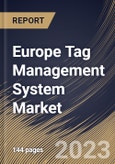A TMS can be used to employ the most effective tags for mobile sites. The fashion industry is evolving toward automatic product tagging. It substitutes manual tagging of fashion products and categories, and classes product photos based on their features utilizing cutting-edge artificial intelligence (AI) algorithms.
These tags have a variety of uses, including data collection, user behaviour tracking, third-party integrations, analytics, and marketing campaigns. Examples include tracking and measurement codes for web analytics (such as Google Analytics), advertising and retargeting (such as Facebook Pixel), conversion tracking, and other purposes. Simplifying the management and distribution of these tags is the main purpose of a tag management system.
TMS solutions frequently offer a user-friendly interface that enables marketers to add, edit, and remove tags from their websites or apps without having direct access to the underlying codebase. They provide centralized control over tag implementation, thereby reducing reliance on IT resources and expediting the deployment and modification of tags.
Digital marketing has become one of the most crucial promotional tools in recent years. TMS platforms help organizations ensure compliance with these regulations by providing centralized control over data tracking and consent management.
Many European businesses operate in multiple countries and languages. TMS platforms enable them to manage and customize tags for different markets and languages efficiently. As the concept of digital marketing gains tremendous traction throughout the region, market participants in the tag management system market are expected to encounter substantial possibilities for expansion.
The Germany market dominated the Europe Tag Management System Market by Country in 2022 and would continue to be a dominant market till 2030; thereby, achieving a market value of $154.7 million by 2030. The UK market is estimated to grow at a CAGR of 11.6% during (2023-2030). Additionally, The France market should witness a CAGR of 13.4% during (2023-2030).
Based on Component, the market is segmented into Tools and Services. Based on Organization Size, the market is segmented into Large Enterprises and Small & Medium Enterprises. Based on Deployment Type, the market is segmented into On-premise and Cloud. Based on Vertical, the market is segmented into IT & Telecom, Media & Entertainment, Healthcare, BFSI, Manufacturing, Retail & Ecommerce and Others. Based on countries, the market is segmented into Germany, UK, France, Russia, Spain, Italy, and Rest of Europe.
The market research report covers the analysis of key stakeholders of the market. Key companies profiled in the report include Adobe, Inc., Tealium, Inc., Google LLC (Alphabet, Inc.), Adform, Oracle Corporation, IBM Corporation, Piwik PRO SA, CHEQ AI Technologies Ltd. (Ensighten, Inc.), Commanders Act, and Coveo Solutions, Inc.
Scope of the Study
By Component
- Tools
- Services
By Organization Size
- Large Enterprises
- Small & Medium Enterprises
By Deployment Type
- On-premise
- Cloud
By Vertical
- IT & Telecom
- Media & Entertainment
- Healthcare
- BFSI
- Manufacturing
- Retail & Ecommerce
- Others
By Country
- Germany
- UK
- France
- Russia
- Spain
- Italy
- Rest of Europe
Key Market Players
List of Companies Profiled in the Report:
- Adobe, Inc.
- Tealium, Inc.
- Google LLC (Alphabet, Inc.)
- Adform
- Oracle Corporation
- IBM Corporation
- Piwik PRO SA
- CHEQ AI Technologies Ltd. (Ensighten, Inc.)
- Commanders Act
- Coveo Solutions, Inc.
Unique Offerings
- Exhaustive coverage
- The highest number of Market tables and figures
- Subscription-based model available
- Guaranteed best price
- Assured post sales research support with 10% customization free
Table of Contents
Companies Mentioned
- Adobe, Inc.
- Tealium, Inc.
- Google LLC (Alphabet, Inc.)
- Adform
- Oracle Corporation
- IBM Corporation
- Piwik PRO SA
- CHEQ AI Technologies Ltd. (Ensighten, Inc.)
- Commanders Act
- Coveo Solutions, Inc.








